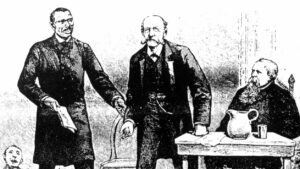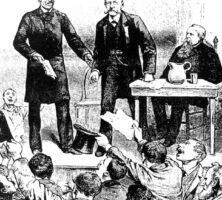The New Georgia Encyclopedia is supported by funding from A More Perfect Union, a special initiative of the National Endowment for the Humanities.
The central office of the Georgia Department of Labor is pictured in 2008 at the corner of Piedmont Avenue and Andrew Young International Boulevard in Atlanta. The Department of Labor, created in 1937, provides workforce and vocational rehabilitation services, in addition to overseeing workplace safety programs and gathering labor and occupational statistics in Georgia.
Courtesy of Georgia Department of Labor
The New Georgia Encyclopedia does not hold the copyright for this media resource and can neither grant nor deny permission to republish or reproduce the image online or in print. All requests for permission to publish or reproduce the resource must be submitted to the rights holder.
Mark Butler, the commissioner of the Georgia Department of Labor, was elected in 2010.
Courtesy of Georgia Department of Labor
The New Georgia Encyclopedia does not hold the copyright for this media resource and can neither grant nor deny permission to republish or reproduce the image online or in print. All requests for permission to publish or reproduce the resource must be submitted to the rights holder.
The Valdosta Career Center, pictured circa 2008, is one of fifty-three career centers administered by the Georgia Department of Labor. These career centers, which aim to assist Georgia workers through training, educational resources, and financial support, replace traditional unemployment offices in the state.
Courtesy of Georgia Department of Labor
The New Georgia Encyclopedia does not hold the copyright for this media resource and can neither grant nor deny permission to republish or reproduce the image online or in print. All requests for permission to publish or reproduce the resource must be submitted to the rights holder.
The Athens Career Center, pictured circa 2008, provides computers and other resources to job seekers in the Clarke County area. The center is administered by the Georgia Department of Labor.
Courtesy of Georgia Department of Labor
The New Georgia Encyclopedia does not hold the copyright for this media resource and can neither grant nor deny permission to republish or reproduce the image online or in print. All requests for permission to publish or reproduce the resource must be submitted to the rights holder.
Michael L. Thurmond, the commissioner of the Georgia Department of Labor, was elected in 1998 and served until 2011.
Courtesy of Dekalb County
The New Georgia Encyclopedia does not hold the copyright for this media resource and can neither grant nor deny permission to republish or reproduce the image online or in print. All requests for permission to publish or reproduce the resource must be submitted to the rights holder.
A representative from Quick Start, a nationally recognized program offering free workforce training to new and exisiting companies in Georgia, makes a presentation to business leaders. Quick Start's services help to attract new investment and job creation in the state.
Courtesy of Quick Start
The New Georgia Encyclopedia does not hold the copyright for this media resource and can neither grant nor deny permission to republish or reproduce the image online or in print. All requests for permission to publish or reproduce the resource must be submitted to the rights holder.
The New Georgia Encyclopedia does not hold the copyright for this media resource and can neither grant nor deny permission to republish or reproduce the image online or in print. All requests for permission to publish or reproduce the resource must be submitted to the rights holder.
Thomas R. R. Cobb was the primary author of the Code of the State of Georgia, which went into effect in 1863, a year after Cobb was killed in combat during the Civil War. Much of this code remains in force today.
Courtesy of Library of Congress, Prints and Photographs Division
The New Georgia Encyclopedia does not hold the copyright for this media resource and can neither grant nor deny permission to republish or reproduce the image online or in print. All requests for permission to publish or reproduce the resource must be submitted to the rights holder.
W. J. Usery (far right), in his role as director of the Federal Mediation and Conciliation Service, talks to workers in a West Virginia coal mine during the 1970s. Usery served as director of the service from 1973 to 1974.
Courtesy of Special Collections & Archives, Georgia State University Library, W. J. Usery Papers, Southern Labor Archives.
The New Georgia Encyclopedia does not hold the copyright for this media resource and can neither grant nor deny permission to republish or reproduce the image online or in print. Requests for permission to publish or reproduce the resource should be submitted to Special Collections and Archives at Georgia State University.
W. J. Usery Jr., a native of Hardwick, was the first Georgian to serve as the U.S. secretary of labor. Appointed to the position by U.S. president Gerald Ford in 1976, Usery resolved major labor disputes in the rubber and trucking industries during his tenure as secretary.
Courtesy of Special Collections & Archives, Georgia State University Library, W. J. Usery Papers, Southern Labor Archives.
The New Georgia Encyclopedia does not hold the copyright for this media resource and can neither grant nor deny permission to republish or reproduce the image online or in print. Requests for permission to publish or reproduce the resource should be submitted to Special Collections and Archives at Georgia State University.
W. J. Usery (right) inspects the Atlas missile launch vehicle with colleagues at the Cape Canaveral Air Force Test Facilities. Usery served as the International Association of Machinists' Grand Lodge special representative to Cape Canaveral in 1956.
Courtesy of Special Collections & Archives, Georgia State University Library, W. J. Usery Papers, Southern Labor Archives.
The New Georgia Encyclopedia does not hold the copyright for this media resource and can neither grant nor deny permission to republish or reproduce the image online or in print. Requests for permission to publish or reproduce the resource should be submitted to Special Collections and Archives at Georgia State University.
W. J. Usery (left) attends a reception in 1978 at the Mayflower Hotel in Washington, D.C., with U.S. president Gerald Ford. In 1976 Ford appointed Usery, who had extensive experience in resolving labor disptures, as the first U.S. secretary of labor from Georgia.
Courtesy of Special Collections & Archives, Georgia State University Library, W. J. Usery Papers, Southern Labor Archives.
The New Georgia Encyclopedia does not hold the copyright for this media resource and can neither grant nor deny permission to republish or reproduce the image online or in print. Requests for permission to publish or reproduce the resource should be submitted to Special Collections and Archives at Georgia State University.
The Knights of Labor played a pioneering role in organizing American and especially southern laborers. In Georgia the Knights gave workers an outlet for protest against low wages and harsh working conditions in relatively new industries, as well as the means to challenge Democratic dominance of local politics.
From Harper's Weekly
The New Georgia Encyclopedia does not hold the copyright for this media resource and can neither grant nor deny permission to republish or reproduce the image online or in print. All requests for permission to publish or reproduce the resource must be submitted to the rights holder.

















